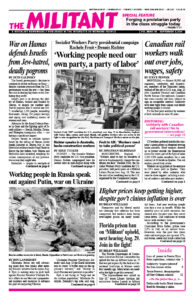MONTREAL — Almost 10,000 rail engineers, conductors and dispatchers, members of the Teamsters union, walked off the job at 12:01 a.m. Aug. 22 after Canadian National and Canadian Pacific Kansas City railroads, Canada’s two cross-country rail lines, refused to sign an acceptable contract. Solidarity with their fight from unions and fellow working people is crucial.
It’s the first joint walkout by workers at both railroads in some 50 years.
CN workers gathered outside the company’s headquarters in Montreal waving union placards. Hotel workers showed up to protest outside the Bonaventure across the street, part of the fight of some 3,500 CSN union members for a new contract at 30 hotels in Quebec. The rail workers joined their action.
Workers set up pickets at the entrance to CN’s main yard in Quebec. They were joined by other unionists who came to show support, including a number of seafarers and other port workers.
“There are lots of attacks on workers right now,” Martin Trudel-Racine, a deckhand on an icebreaker and member of the Public Services Alliance, told the Militant. “This one is special because the bosses are putting economic stress on the whole country to push for the contract they want.”
Jagmeet Singh, the leader of the New Democratic Party, came to the picket, shaking hands and telling rail workers the party wouldn’t support any move by the government to intervene.
The Brotherhood of Locomotive Engineers and Trainmen in the U.S. said they will stand with their fellow workers in Canada, and told the unions members they can refuse to cross any picket line set up by Canadian rail workers.
Canadian rail workers had voted to strike by 98%, rejecting the companies’ demand to let a new contract be imposed by an arbitrator and for concessions that “could tear families apart” and “jeopardize rail safety,” said Paul Boucher, president of the Teamsters Canada Rail Conference.
After the Canadian Industrial Relations Board ruled Aug. 9 that the rail workers have the right to strike, Labour Minister Steven MacKinnon rejected the rail bosses’ demand that he bar a strike and impose compulsory arbitration.
Both railroads announced that they would lock workers out Aug. 22 unless they agreed to make dangerous concessions in their work schedules and safety. The union refused and announced a coast-to-coast walkout.
“CPKC wants to gut the collective agreement of all safety-critical fatigue provisions,” the union said. “Train crews would be forced to stay awake even longer, increasing the risks of derailments and other accidents.” Canadian National wants to impose “a forced relocation scheme, which would see workers ordered to move across the country for months at a time to fill labour shortages” and “extend workdays in all provinces west of Ontario.”
Transit authorities say commuter trains that carry 32,000 passengers a day in Toronto, Montreal and Vancouver will be suspended as result of the walkout.
For decades bosses in Canada and the U.S. have been running longer and longer trains with smaller train crews and fewer maintenance workers. While this has yielded massive profits for the railroads, it’s increasingly dangerous for rail workers and those who live near the tracks.
An explosion in Lac-Mégantic from a runaway train in 2013 killed 47 people. Since then, at least 22 more rail workers have died and 110 seriously injured on the job. Neither the government nor the railroads make these figures public. In addition, over the past 10 years, 637 people have died in collisions at unsafe crossings and other incidents and 470 have been seriously injured.
Workers at both CN and CPKC, as well as in the U.S., have been fighting for safer working conditions for years. In 2015 Canadian Pacific rail workers walked off the job for two days with signs saying “Fatigue kills.” In 2019 Canadian National workers fought an eight-day “strike for safety” and more human work schedules. One of their slogans was, “We’re tired of being tired.”
“The fight for safety is a vital question for workers on the tracks and all those living around it,” Philippe Tessier, a CN rail conductor and Teamsters picket captain in Montreal, told the Militant.
“We need to use union power to fight for workers control over safety and to reach out and win solidarity from other unionists and working people as a whole. This is the only road to win safer, larger crew size; shorter trains; and control over our working conditions.”
In 2022 four U.S. rail unions voted to strike over similar issues. However, President Joseph Biden rammed through bipartisan legislation imposing a contract on them and banning their strike.
Like Washington, Ottawa backs the rail bosses. Walkouts by Canadian Pacific rail workers in 2012, 2015, 2018 and 2022 all ended under threat of federal strikebreaking intervention.
The Quebec division of the Public Service Alliance of Canada union issued a statement of support for rail workers, calling on railroad bosses “to resolve this dispute through collective bargaining and by addressing the workers’ key demands at the table,” not through locking workers out and trying to impose compulsory arbitration. They also opposed any attempt by Ottawa to impose back-to-work legislation.
Canada’s railroads transport roughly 1 billion Canadian dollars ($735 million) worth of goods a day, including half the country’s exports. The rail shutdown will be “a catastrophe,” claimed Greg Northey, vice president at Pulse Canada, which represents major food exporters. “Literally nothing will move,” he said.
The capitalist media has been full of similar warnings from business associations and corporations in an effort to beat back support for the workers and to pressure the government to intervene.
The boss press is especially keen to pit farmers and rail workers against one another.
An article in the Calgary Herald was headlined, “Southern Alberta farmers say potential rail strike or lockout would harm Canada’s international reputation.” David Bishop, the only farmer quoted, is a long-time member of the Alberta barley, wheat and grains boards, representing the interests of large capitalist farmers. The article didn’t mention he is also a member of Canadian National Railway’s “Agricultural Advisory Council.” The council’s purpose is to promote pro-company, anti-union propaganda while giving the impression it speaks on behalf of small, family farmers.
In their 2019 strike for safety, CN workers won solidarity from these farmers.
Workers on both railroads walking out together greatly increases their striking power. As a result of a joint action in 1950, rail workers won their demand to reduce the workweek from 48 to 40 hours for the same pay, a victory that has been under attack ever since.
Philippe Tessier, a CN rail conductor and member of the Teamsters, contributed to this article.


